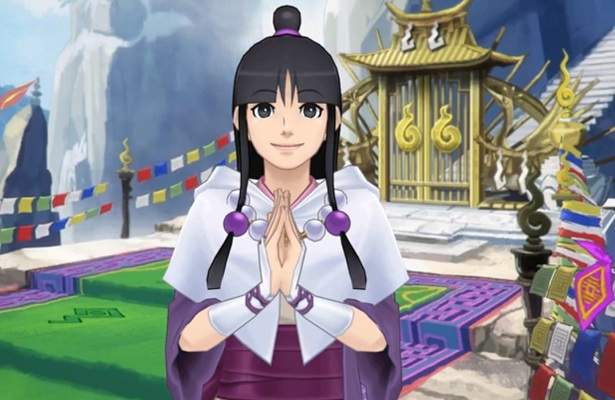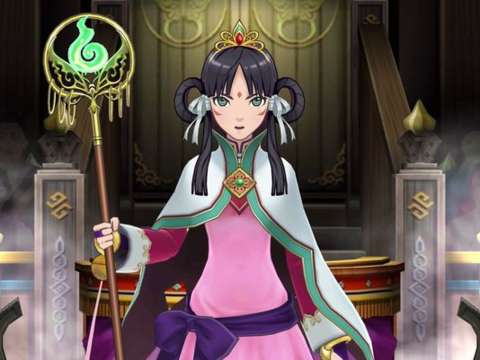Ace Attorney's Creators Talk the New Title and Localization
No objection.
Ace Attorney: Spirit of Justice, the sixth installment in the main-line Phoenix Wright puzzle series , is coming to the West this fall. We got a chance to play the game at Tokyo Game Show last year and were impressed by the new interrogation mechanics, which include a priestess reading the final thoughts of the dead to solve heinous murders. After hands-on time with the English version, we sat down with longtime series producer Motohide Eshiro, director Takeshi Yamazaki, and localization director Janet Hsu (who also helped with translation] to talk about the inspirations behind the new game.
Update: After clarifying a few points with representatives from Capcom, we've made a few changes below. We apologize for the error in quote attribution.
GameSpot: The games haven't featured the character Maya Fey in a while, but you're bringing her back for Spirit of Justice. Also, the previous few games have been more grounded and moved away from the spiritual aspect, and yet here you are going all-in for the new game. Why?
Eshiro: So this is a little hard to answer without spoiling anything... But if you've been keeping up with the Japanese side, you already know [about Maya]. The official line right now is that there's a certain character that is involved in the story this time, and to include her we decided that it would be good to bring back the spiritual elements.

It wasn't just only to bring back the main character. Also, basically, we do still look at it from a game perspective. In order to have this spiritual gameplay system, then what kind of world or what kind of situation would you need to have a spirit divination or a seance trial? The gameplay system came from the setting of the kingdom of Khura’in [pronounced koo-rye-n], and for the world-building--what kind of kingdom is it? What do they do there? For Phoenix to be in a really tough position, to put a spin on things so that Phoenix doesn't seem overpowering, because at this point he is known as a legendary attorney... How could we put him in a bind? Well, what if we had a country where everyone hated lawyers? What if we had a country where lawyers were not only disrespected but actually hated? These kinds of elements came from the various different elements we wanted to include, including the gameplay system itself.
What was the inspiration for Rayfa?
Yamazaki: In this country of spiritualism, we needed a character that could be an enemy in court to Phoenix, and to be a rival. She also then became the person through which the divination/seance gameplay mechanism can be used.
And so one of the things with her storyline is seeing how she interacts with Phoenix, seeing how her perception of lawyers changes as you progress through the game.

It's interesting that in this game you have a whole country that hates lawyers, because the previous Phoenix Wright games dealt with "the Dark Age of the law." Is there some sort of commentary here, or something on how you feel, since the games are always about corrupt courts and hating lawyers?
It's not so much that we like dystopian courtrooms or anything like that, it's not like any sort of commentary or anything. In terms of good story-writing, you need some sort of conflict. With this game, we needed some impactful reason... When you explain the game to someone, if they're not immediately caught by the premise of your story, you'll be like "who cares?" But if you say it's about a dark age of the law, or something's gone wrong, or lawyers are hated in this country--it makes you wonder what's going on. From that starting point, we hope the people will be interested in the game, you want to know what happened, you want to know why that is. That gives us a good starting point to then actually develop a good story from that. You have this bad situation, a place where lawyers are hated, so then, how do you change the situation? How do they grow? How do they interact with this setting? This time around our theme is revolution: if you don't have a system where lawyers are hated, what is there to revolutionize? So that's the reason we started with these premises, so the story had somewhere to go.
The localizations of the Phoenix Wright games take place in a vague "Japanamerica," and many cases are steeped in Japanese culture. Some of these themes may not translate well for some players. What are the challenges of localizing this series?
Hsu: First of all, the game is made in Japan, so we make it in Japanese and the staff doesn't think about the localization at all. Once you start thinking about it, then you have to consider so many things, and you start locking yourself into a little space, right? To keep it so that they can make as creative of a product as possible, as creative of a story as possible, we don't think about the localization, we just make it as interesting as we can. When localization happens, I will sit down with [the team] and say, okay, this part should probably be localized because I'm not sure a lot of people outside of Japan would understand it. And he might say, "Well, let's keep it because it's important to the story or this character." Through this back and forth we decide the bigger picture of what to keep and what not to keep Japanese in that sense.
I based some of my decisions on the times. For example, nowadays people [in the West] know what ramen is but 10 years ago people didn't know what ramen was in the same way. I do go through and adjust, fine-tune what needs localizing and what doesn't based on what people know at that time.
What feedback from the previous game, Dual Destinies, did you keep in mind when making Spirit of Justice?
Eshiro: We got some really strong feedback from a lot of players after Dual Destinies, particularly involving the difficulty level. A lot of people thought the game was too easy. When we were making it, one of the things we wanted to do was make the investigation sections simpler and streamlined to play through so that you could get straight to the trials. That's what everyone loves.That's the meat of this series. But in doing so, we realized that maybe players wanted a little bit more difficulty and more things to do. So for Spirit of Justice we brought back the ability to examine all the different background [areas] so it's not just the 3D areas where you can examine things from different angles. You'll be able to banter with characters again.
Players also said the puzzles were too easy, that it was too easy to know where the contradictions were in the court statements. So we made sure this time that it was a bit more difficulty so the answers aren't just fed to you. You actually have to think through the questions and what you're being asked. For users who want a little bit of a hint, we did keep the partner consultation feature as well. But you can also implement a system to turn it off completely, if you go into the options menu you can turn it off so the button doesn't even show up. We tried to implement a couple of these functions--like text skipping as well--we understood that's what players wanted. So from the very beginning you can turn that on. There's a lot of these little customizable options that we think players will hopefully really like and are a result of the feedback from Dual Destinies.
Will we ever get a localized version of Daigyakuten Saiban?
Eshiro: Unfortunately there's a number of circumstances... We absolutely do want to bring it to the West, but unfortunately due to these circumstances right now... I'm really really sorry! Nowadays on the Internet lots of fans are directly asking us, "Where's Daigyakuten Saiban?" On livestreams, even in the Japanese ones, people from the West will write in and ask where it is. Every time we say, we're sorry! Certain circumstances are kind of getting in the way.
Got a news tip or want to contact us directly? Email news@gamespot.com
Join the conversation